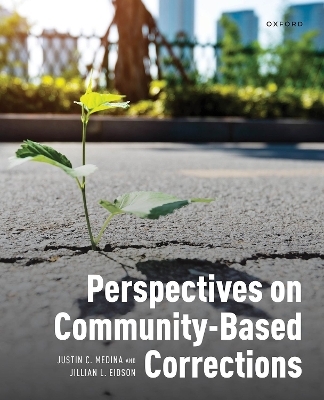
Perspectives on Community-Based Corrections
Oxford University Press Inc (Verlag)
978-0-19-760733-6 (ISBN)
- Lieferbar (Termin unbekannt)
- Versandkostenfrei innerhalb Deutschlands
- Auch auf Rechnung
- Verfügbarkeit in der Filiale vor Ort prüfen
- Artikel merken
Students generally take this course because they are preparing for a career in the field, so they need to be aware of current policies and practices in community corrections. In addition, given the decarceration trend and the economics of seeking incarceration alternatives, this topic is increasing in popularity and importance. This text takes an applied and practical approach to understanding community corrections, as well as changing data and policies. It will aid in understanding the complexities of community-based corrections with up-to-date data on practice and effectiveness. Finally, its modular approach offers flexibility and versatility for instructors.
Justin C. Medina, Ph.D. is Assistant Professor of Criminal Justice at Lycoming College and former probation/parole officer. He earned his doctorate degree in Criminal Justice from Temple University. He has published scholarly articles about decision making in community-based corrections and teaches a community-based corrections course to undergraduates. His teaching and research interests pertain to examining discretion in criminal justice processing and studying how perceptions and attitudes form about the justice system. Jillian L. Eidson, Ph.D. works at the Charleston Police Department in South Carolina improving practice and promoting research. Prior to serving in this role, she was a probation/parole officer and research director in Philadelphia, Pennsylvania. As a dedicated "pracademic", she serves criminal justice agencies by helping them translate research into policy and procedure. Past research studies in which she has participated focused on risk-need-responsivity, cognitive-behavioral therapy, gang desistance, opioid use disorder, and probation and parole officer empathy. She holds a doctorate in Criminal Justice from Temple University.
Contents in Brief
Table of Contents
List of Additional Insight Boxes
List of Internet Resources Boxes
List of Images
List of Tables and Figures Boxes
Preface
Acknowledgements
Part 1. Understanding Community-Based Corrections for Adults
Chapter 1. Contextualizing Community-Based Corrections
Introduction and Learning Objectives
Understanding Community-Based Corrections
Forms of Community-Based Corrections
What Does Community-Based Corrections Aim to Achieve?
Controlling and Changing Behavior in Society
Correctional Control and the Decarceration Process
A Snapshot of Contemporary Community-Based Corrections
Community-Based Corrections as Part the Justice Process
Summary and Connecting Chapter Content
Discussion and Reflection Questions
Put into Practice
A Question of Ethics
Additional Video and Multimedia Resources
Bibliography
Chapter 2. The Perspectives and Experiences of Individuals Under Supervision
Introduction and Learning Objectives
Understanding the Perspective of Individuals Experiencing Community-Based Corrections
Community-Based Supervision and Invisible Punishments
Economic Impacts on Individuals Under Supervision
Housing Restrictions on Individuals Under Supervision
Instrumental Impacts on Individuals Under Supervision
Psychological Impacts on Individuals Under Supervision
Negative Effects
Positive Effects
System-Based Critiques of Community-Based Corrections
Lack of Transparency
Communication Failures
Advice for the Community-Based Supervision Officer
Develop a Positive Working Relationship Collaborate
Collaborate with Others to Address Issues
Be a Change Facilitator, Not an Inhibitor
Communicate Honestly, Clearly, and Often
Summary and Connecting Chapter Content
Discussion and Reflection Questions
Put into Practice
A Question of Ethics
Additional Video and Multimedia Resources
Bibliography
Chapter 3. Ideals, Aims, and Realities of Supervision
Introduction and Learning Objectives
Criminological Perspectives to Better Understand and Address Unwanted Behavior
Aims of Criminal Sanctioning Through a Community-Based Corrections Lens
Rehabilitation
Deterrence
Restoration
Incapacitation
Retribution and 'Just Deserts'
Achieving the Aims of Community-Based Corrections Interventions and incentives
Interventions and Incentives
Ideals and Realities: An Example of the Right Amount of Supervision
Summary and Connecting Chapter Content
Discussion and Reflection Questions
Put into Practice
A Question of Ethics
Additional Video and Multimedia Resources
Bibliography
Chapter 4. Enduring Practices in Probation and Parole
Introduction and Learning Objectives
The Origins of Community-Based Corrections
A Brief History of Probation and Pretrial Supervision
The Development of Parole and Work Release Programs
Legacies on Contemporary Practices
How Probation and Parole Agencies are Organized
Branches and Level of Government that Administer Probation and Parole
Summary and Connecting Chapter Content
Discussion and Reflection Questions
Put into Practice
A Question of Ethics
Additional Video and Multimedia Resources
Bibliography
Chapter 5. The Nature of Working in Community-Based Corrections
Introduction and Learning Objectives
What Is Needed for a Career in Community-Based Corrections
Building Skill Through Education and Experience
Career Opportunities
Training and Advancement
The Practice of Community-Based Corrections Officers
Professional Conduct in Community-Based Corrections
Shifts in Correctional Policies and Practices
Discourse About Punitiveness in Community-Based Supervision
Summary and Connecting Chapter Content
Discussion and Reflection Questions
Put into Practice
A Question of Ethics
Additional Video and Multimedia Resources
Bibliography
Part 2. Forms of Post-Sentence Community Supervision for Adults
Chapter 6. Understanding the Probation Sentence
Introduction and Learning Objectives
What Is Probation?
The Probation Sentence Decision-Making Process
Features of Probation Supervision
Care Versus Control in Probation Practice
Probation as Rehabilitation
Probation as Social and Crime Control
A Critique of 21-Century Probation Practices
Summary and Connecting Chapter Content
Discussion and Reflection Questions
Put into Practice
A Question of Ethics
Additional Video and Multimedia Resources
Bibliography
Chapter 7. Post-Incarceration Supervision and Community Reintegration
Introduction and Learning Objectives
The Challenges of Reintegrating Back into The Community
Why Release Prisoners onto Parole?
Discretionary Parole Release
Mandatory Parole Release
Parole Conditions and Decision Making
The Decision to Revoke Parole
Critiques of the Parole Process
Extralegal Factors in Parole Decisions
Controversy over Parole Boards
Parole within a Reentry Context
Summary and Connecting Chapter Content
Discussion and Reflection Questions
Put into Practice
A Question of Ethics
Additional Video and Multimedia Resources
Bibliography
Chapter 8. Conditions and Intermediate Sanctions
Introduction and Learning Objectives
What Are Conditions of Supervision?
The
| Erscheinungsdatum | 03.01.2024 |
|---|---|
| Verlagsort | New York |
| Sprache | englisch |
| Maße | 226 x 198 mm |
| Gewicht | 590 g |
| Themenwelt | Recht / Steuern ► EU / Internationales Recht |
| Recht / Steuern ► Strafrecht ► Kriminologie | |
| Recht / Steuern ► Strafrecht ► Strafverfahrensrecht | |
| ISBN-10 | 0-19-760733-0 / 0197607330 |
| ISBN-13 | 978-0-19-760733-6 / 9780197607336 |
| Zustand | Neuware |
| Informationen gemäß Produktsicherheitsverordnung (GPSR) | |
| Haben Sie eine Frage zum Produkt? |
aus dem Bereich


